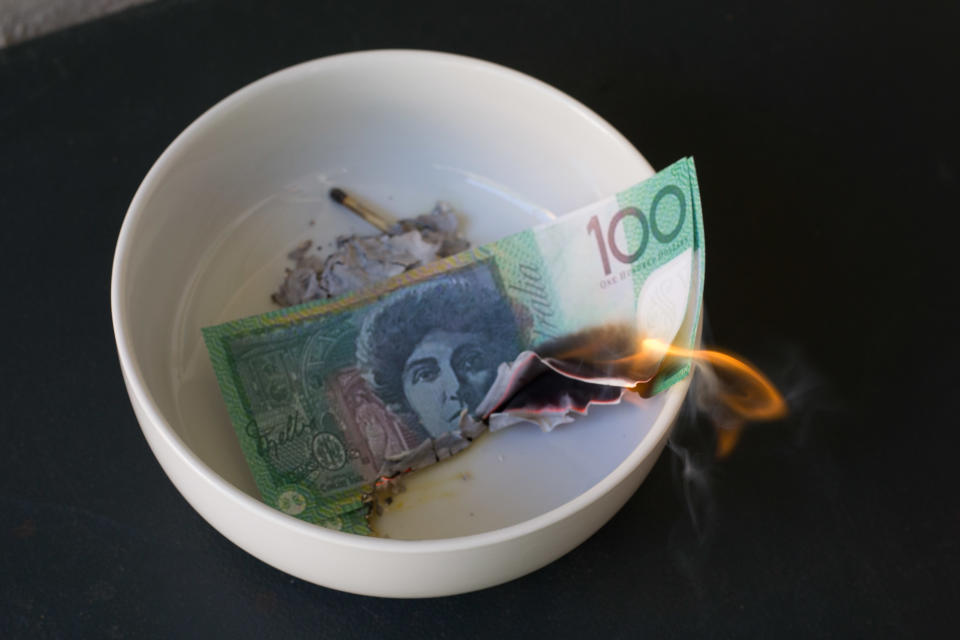4 money traps to avoid during a recession

When an economy is pushed into a recession it can negatively affect your personal finances. But there are things you can do, or avoid, to keep your personal finances afloat while Australia’s economy takes a beating.
When an economy is in recession, financial risk increases, jobs and income are less stable, household spending generally dips, people start defaulting on their home loan payments, and our savings and superannuation take a hit.
More on Recession 2020:
The good news is there are steps you can take to reduce your exposure to financial risk and lessen the blow of a recession on your personal finances.
4 things you should avoid doing in a recession
Don’t take on new debt
Our record-low interest rates might make it seem tempting to buy a new home or another big purchase and lock in a low rate, but taking new debt at a time when the economy is volatile could spell trouble in the short-term.
Folding businesses, jobs cuts, redundancies and pay decreases could see many Aussies have their income, and therefore their ability to repay debt, slashed dramatically.
It could leave you relying on your savings to make ends meet, if it hasn’t already been spent since the pandemic hit earlier this year.
Taking on new debt during the coronavirus recession, or any recession, is risky because instability goes hand in hand with uncertainty.
Don’t get an adjustable-rate home loan
If you decide the above doesn’t apply to you, your savings are robust and your income and personal finances are stable, you might decide to take the plunge and buy your first property or another investment property.
At which point you’ll want to avoid taking out an adjustable-rate home loan. Interest rates tend to go down during a recession as governments attempt to stimulate spending in order to slow down any decline in the economy by cutting interest rates.
Low interest rates help to stimulate growth by making it cheaper to borrow money and less favorable to save which in turn prompts both individuals and businesses to take advantage of low-cost borrowing and the opportunities to make or save money.
For the COVID-19 recession in Australia, official interest rates were cut to 0.25 per cent in March as the COVID-19 pandemic hit our economy and saw it dive into a once-in-a-lifetime recession.
But while Governor Philip Lowe says the Reserve Bank plans to keep rates at its record-low on hold for the foreseeable future, it is unlikely to follow in the footsteps of the Eurozone and Japan and implement a strategy of having negative interest rates.
With the RBA targeting 0.25 per cent for the Commonwealth government bond yield, Lowe is indicating that, based on the current outlook, a change in the official cash rate is unlikely before 2023.
But the point is, interest rates will increase at some point, and if you have an adjustable-rate mortgage, so will your repayments.
Don’t take on investment risk
While business owners should always be thinking about how to grow their business, an unstable environment isn’t the time to make risky investments.
This means avoiding investments or projects which require you to take on new debt because if business slows you might have put yourself and your business at more risk of folding.
Instead business-owners should be savvy with how they spend their money and look to invest in their business as the uncertainty starts to wane and the economy regains stability.
Don’t dump stocks as soon as they lose value
If stocks can be volatile even when an economy is strong, imagine how volatile some could be when an economy is in recession.
While seeing your portfolio nosedive can be upsetting, it’s important to remember you haven’t lost money until you decide to sell up at a loss so it's best not to make any rash decisions which could negatively impact your portfolio value.
What could the coronavirus recession look like?
Businesses will continue to fold as they are unable to withstand the financial ruin facing them as a result of the coronavirus pandemic.
And we’ll continue to see jobs lost.
Paying rent, phone, internet, utility bills and even a mortgage will become more of a struggle and so bills will go unpaid.
With less income, household spending will drop further.
And then the vicious cycle continues: consumers who are less willing to spend means more and more businesses will struggle, and it goes on.
And of course, the property market suddenly finds fewer buyers, meaning house values drop.
Global stock markets have also been volatile for the last few weeks, and investors saw several days where hundreds of billions of dollars were wiped off every time – and we don’t seem to have reached the bottom yet.
While Australia’s economy wasn’t in the strongest standing to begin with, the reason behind most business closures are circumstantial and specific to the virus.
The Morrison government has so far announced two stimulus packages totalling $83.6 billion, to cushion the economic blow on individuals and businesses impacted by the stringent restrictions implemented to curb further spread of the virus and aid our economic recovery.
The government will spend a combined $22.9 billion on income safety nets of $550 per fortnight for those who have lost their jobs, sole traders and casuals and a $750 one-off supplement for those on certain welfare, pension and concession payments.
Meanwhile, Australia’s banks have also thrown a $100 billion lifeline, which will pause mortgage repayments until next year for Aussies who have fallen into financial hardship as a result of Covid-19.
Want to get better with money and investing in 2021? Sign up here to our free newsletter and get the latest tips and news straight to your inbox.
Follow Yahoo Finance Australia on Facebook, Twitter, Instagram and LinkedIn.

 Yahoo Finance
Yahoo Finance 
